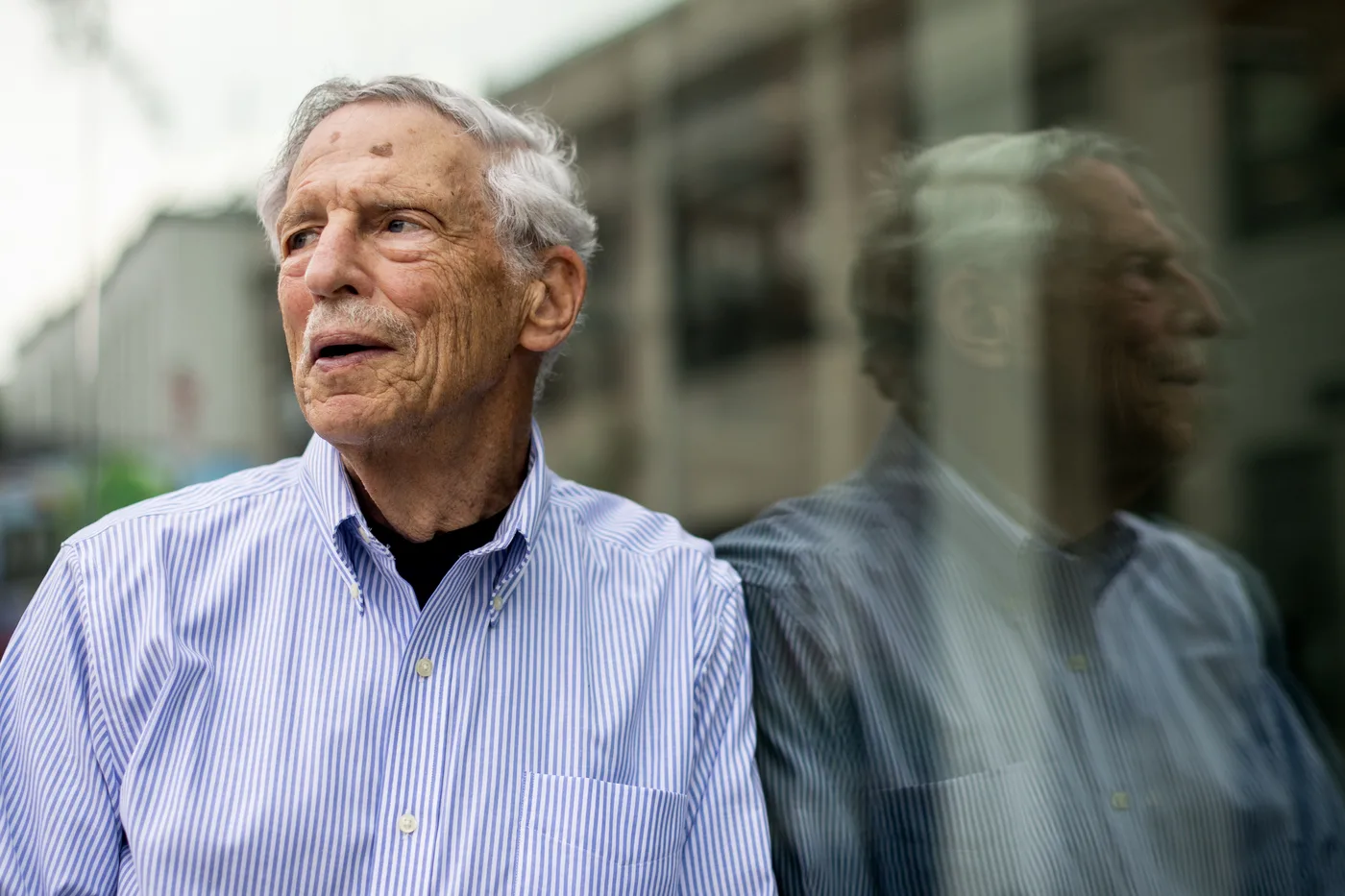Published on
He represented Muhammad Ali. He argued a case before the Supreme Court at just 26. Now he’s retiring from Northeastern
Northeastern’s George J. and Kathleen Waters Matthews Distinguished University Professor of Law, who helped actualize the law school’s experiential learning mission while overseeing the development of its building, is retiring after 44 fruitful years.

From the mahogany-filled courtroom of the U.S. Supreme Court to the most prestigious lecture halls in higher ed, Michael Meltsner has been there, done that.
Northeastern’s George J. and Kathleen Waters Matthews Distinguished University Professor of Law, who helped actualize the law school’s experiential learning mission while overseeing the development of its building, is retiring after 44 fruitful years. He held the endowed chair for 35 years while working to nurture the school’s hands-on approach to legal education, hiring numerous star faculty and inspiring countless students along the way.
In addition to his immense influence at Northeastern, Meltsner embarked on his own storied legal career in 1961 that resulted in many career-defining victories that very consequential decade. During that time, he ardently fought to end racial segregation and capital punishment, bringing him before the U.S. Supreme Court on a half-dozen occasions. He represented boxing legend Muhammad Ali in the case that enabled the champion prizefighter to return to the sport after a three-year hiatus. And he was influential, through his tireless activism, in helping to bring about Title VI of the Civil Rights Act of 1964.
The Ali case involved a slew of legal questions and complications that ultimately concluded in a ruling that the boxer had been wrongly—and arbitrarily—denied a boxing license. In 1966, Ali refused to serve in the U.S. Armed Forces, making the case to a local draft board in Louisville, Kentucky, that he was a conscientious objector. His bid to avoid being drafted set off a chain reaction of litigation, Meltsner says, that led to Ali being stripped of his heavyweight title, and his ability to box.
NAACP Legal Defense Fund
The details played out as Meltsner, then a young attorney at the NAACP Legal Defense Fund in the mid-1960s, watched on with interest. Eventually, the opportunity to represent Ali landed on Meltsner’s lap.
“Part of what I learned from my dad was that many of the great boxers of the time had criminal records,” Meltsner tells Northeastern Global News. “So when I was drafting the complaint in the Ali case, I included language that suggested that the New York State Athletic Commission, which had pulled his boxing license and his heavyweight crown, was uniquely singling him out.”
A federal judge decided that New York State had wrongly denied Ali, who was a member of the Nation of Islam, a boxing license while approving licenses for 244 others. The decision saw Ali return to the sport. “It was a case of covert racism,” Meltsner says.
The case is something of a keystone moment in Meltsner’s career, one worthy of rehashing in longform, no doubt. But looking back on his life and legacy ahead of his decision to step away from teaching, the 86-year-old scholar was longing to discuss his views on what constitutes a good legal education, then and now.
“It’s sort of ironic that I would become a law professor and dean for over 50 years, because I wasn’t fully satisfied with my legal education at Yale Law School,” Meltsner says. “There were brilliant teachers, but I yearned for more information and experience with the practice of law, and there were very few if any opportunities to do that.”
Indeed, his very first act as dean—one that he’d made conditional prior to his arrival at the university—signaled a willingness to get his hands dirty à la the Northeastern way. The American Bar Association, which regulates the accreditation of law schools, had declared the old NUSL building substandard. Before the Cargill Hall complex opened in 1983, the law school was housed in Gryzmish Hall, the building at the corner of Huntington and Forsyth that now houses the law library.
“It was filled with concrete blocks, the classrooms were too small and the furnishings were out of date,” Meltsner recalls. “And the American Bar Association found then that the building was substandard—and it was.”
Meltsner promptly sought to upgrade it, spending the first several years of his tenure as dean overseeing the construction and operationalization of a new law school building.
Impact on legal pedagogy
Meltsner’s impact on legal pedagogy—his reputation within the law school community—can hardly be understated. He started one of the first clinical—meaning, “learning by doing”—legal education programs in the country at Columbia Law School, mixing praxis and experiential education with more traditional classroom-based pedagogy. He brought that vision for teaching to Northeastern in the late 1970s, where it was already beginning to take shape as the university’s signature approach to education.
“I didn’t want what used to be called ‘experiential education’ to be just a course,” Meltsner says. “I wanted the whole law school to be organized around values that emerged from the practice of law. And the only place in the country that did that was Northeastern.”
When Meltsner first began teaching law, the prevailing academic approach to legal instruction, born out of the so-called case method, focused on dissecting cases and simulating arguments in a controlled classroom setting. “Underlying this [approach] was an epistemology that assumed the law was kind of like a science,” Meltsner explains. “The idea here being that you’ll be a great lawyer if you learn how to analyze and discern cases and persuade judges and clients about what [the cases] mean.”
But he says the dominant method didn’t adequately prepare students to step into the courtroom, or to deal with the social and political realities of the profession. Most cases, he says, are decided by negotiation—a skill that Ivy League legal curricula “hardly touched, if at all” in the 1960s and 1970s. Indeed, much of the effort and activity that goes into remedying disputes, Meltsner says, is carried out in law offices, where attorneys speak directly to clients and negotiate on their behalf.
Meltsner, alongside colleague and collaborator Philip Schrag, helped to bring into sharp resolution that experiential approach to practice—one that focused on client relationships, interviewing, negotiating and strategy and tactics. As Northeastern’s program grew during his stay, it attracted a new cohort of students: those who had also been accepted into Harvard or Yale, but who opted instead for experience in the field as a core part of their legal education on offer at NUSL. “It was, and is, a great model,” Meltsner says.
“When I was dean, there was one Northeastern graduate who was a partner at a downtown firm,” Meltsner says. “And I mean now there are hundreds, and the reason there are hundreds is because firms and judges got to experience students as co-ops, and they were impressed—and then they hired them.”
Paradigm shift in legal education
The paradigm shift in legal education Meltsner helped to usher in would prove critical in fighting inequities in representation and legal aid that have plagued the field. Meltsner contends that students who receive the traditional education without practical training are less likely to represent low-income clients and, therefore, champion civil rights and the public interest professionally. Indeed, it’s those causes, and others, that defined Meltsner’s career as a lawyer, earning him his own small but notable chapter in the broader civil rights movement.
Hired by Thurgood Marshall, the U.S. Supreme Court’s first Black justice, at 24, Meltsner became the second white lawyer on the staff of Legal Defense Fund, the country’s premier legal organization fighting racial injustice. Two years later, at just 26, he argued and won a capital punishment case before the Supreme Court (one must have three years of lawyering under their belt to go before the high court and so, Meltsner says, a special motion was needed). The case would touch off a legal campaign aimed at abolishing the death penalty in the U.S.
He was also the only attorney at the Legal Defense Fund in the 1960s to bring health care cases, he says. The most consequential case Meltsner oversaw was Simkins v. Moses H. Cone Memorial Hospital, which ended racial segregation in hospitals and, he says, formed the intellectual basis for Title VI of the Civil Rights Act of 1964.
Of course, the ruling itself didn’t bring about reform. “Just because you win a case, doesn’t mean you get the kind of change you desire,” he says. “We then went about agitating and lobbying the federal government to actually implement the principle of integration in these Southern hospitals.”
Legend in civil rights, anti-death penalty circles
Daniel Medwed, Northeastern University distinguished professor of law and criminal justice, says that Meltsner is “a legend in civil rights and anti-death penalty circles.” Indeed, the Marshall Project, a nonprofit publication covering issues of the American criminal justice system, said previously that he and Tony Amsterdam, another legendary litigator and legal scholar, “did more to shape the death penalty law than any other attorneys in American history.”
“[Meltsner] has been called the unsung hero of the movement to abolish the death penalty, given his role as an architect of the strategy that gave us the seminal 1972 Supreme Court opinion, Furman v. Georgia, which led to a brief hiatus in capital punishment in the United States,” Medwed says.
During a prior tribute to Meltsnter—there have been countless over the years, rightly so—Rose Zoltek-Jick, associate teaching professor and associate director of the Civil Rights and Restorative Justice Project at Northeastern, said that Meltsner’s passion for the law, activism and teaching defied “silos of genre, convention and conceptions as to what defines a career.”
Across nearly a half-century of legal practice and education, Meltsner would go on to argue five other cases before the Supreme Court, write more than a half-dozen books, including several legal memoirs, novels and plays.
Tanner Stening is a Northeastern Global News reporter. Email him at t.stening@northeastern.edu. Follow him on Twitter @tstening90.


